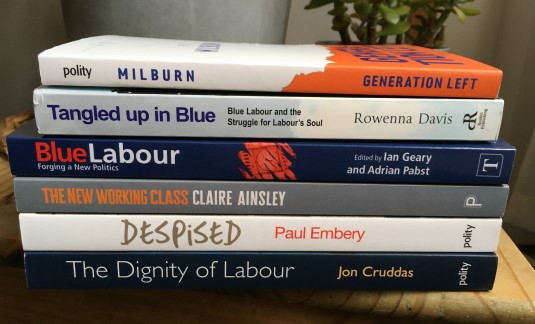
Reveal time. The first book is done and I'm just waiting for the proofs, so what now? A summer of reading and retro gaming has its appeal, but there is that itch again, and the irritation is the persistent bullshit of Blue Labour. It's the smell that won't go away, a putrid stench emitting from the suggestion success is possible only if Labour turns its back on anti-racism, liberation struggles, and proper (as opposed to EU/NATO) internationalism. Faith, family, and flag is the road Labour has to travel with Keir Starmer in the clown car's driving seat. Now, I'm not so daft to believe a book taking apart Blue Labour's absurdities is going to kill it dead, but the battle for hearts and minds is won by slogging away and adding to the weight of opinion. The struggle is not won by not making the argument.
And so yes, something quite lengthy about Blue Labour, how its cultural horizons are consistent with and exemplifies the Labour right's politics, and how it is effectively the working through of their collective death instinct. For the end point of Blue Labour is not victory and permanent electability, but a party completely closed off to who would be its natural support. This is an organisation doomed to chase constituencies who don't vote Labour and will never vote Labour, but at least a true blue Labour would be sealed and shielded from outside influences. No awful left wingers expecting a say, no radicalism, a party that is entirely predictable and rigid, unable and unwilling to connect with political realities ... and therefore ready for the grave. Blue prefacing the green of putrefaction, if you like.
Writing to write off these conceits would be easy and straightforward enough, and it is tempting just to let the froth overflow and bang something out quickly. But there's something else niggling away at me. It's our friend immaterial labour, a concept entirely ubiquitous as far as discussions here about class and politics go. This could do with a bit more elaboration, a thinking through of its limits, and also why the explanation it offers for the cultural divide between the class cohorts of younger workers and the asset-owning older workers and retirees is, well, invisible to political science. After all, the discipline as a whole knows there is a link between material conditions and culture. What is oft hailed as the most successful concept in political science by political scientists - Ronald Inglehart's postmaterialism thesis - still doesn't allow them to join the dots. And there is the everyday banal reality of immaterial labour, why is it so difficult for those whose job is to think about politics can't or won't think through its political implications? Especially when they're (privileged) immaterial workers themselves? Truth be told, an elaboration of the politics of immaterial labour was on the cards a couple of years ago for my chapter in Mark Perryman's Corbynism from Below, but life and work intervened and instead the book got something on how the new class dynamics were reconfiguring the Labour Party. Time to dust off the fragmentary original draft and fill it with new life.
And so this is the project starting to condense out of the mist. A restatement and elaboration of immaterial labour, and an evisceration of Blue Labour. What's not to like? No book plan yet let alone a publisher sorted, but it's there in the background, weighing on the brain not as a nightmare but as something to look forward to.
I am looking forward to your book. But it sounds as though on one issue at least, you have some sympathy with Blue Labour: Brexit.
ReplyDeleteI too would very much like to see this book.
ReplyDeleteDescribing as a 'boring provocateur' strikes me as praising with faint damnation if you'll forgive me.
ReplyDelete«if Labour turns its back on anti-racism, liberation struggles, and proper (as opposed to EU/NATO) internationalism. Faith, family, and flag is the road Labour has to travel with Keir Starmer in the clown car's driving seat. Now, I'm not so daft to believe a book taking apart Blue Labour's absurdities»
ReplyDeleteBut that is written as if the only difference between Blue Labour and Red Labour was on "identity politics", and Blue Labour differed from Purple Labour (mandelsonianism) also on being un-thatcherite.
But really what matters most (to me and many) is that Blue Labour and Purple Labour are both thatcherite whigs on economic policy, with Blue Labour being nominally tory on identity politics, and Purple Labour being whig on identity politics.
I can understand the argument that in a socialdemocratic perspective Red Labour should opportunistically tone down identity politics to avoid losing the votes of the culturally conservative but economically progressive working class, but Blue Labour is not like that.
That is the bigger difference: Blue Labour is thatcherite, Red Labour is not.
It would be helpful if 'Blissex' talked about politics instead of colours.
ReplyDeleteForgot to add my copy of Tangled Up in Blue is signed.
ReplyDelete*Describing Paul Embery as a boring provocateur, I meant to say.
ReplyDelete